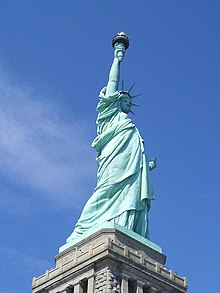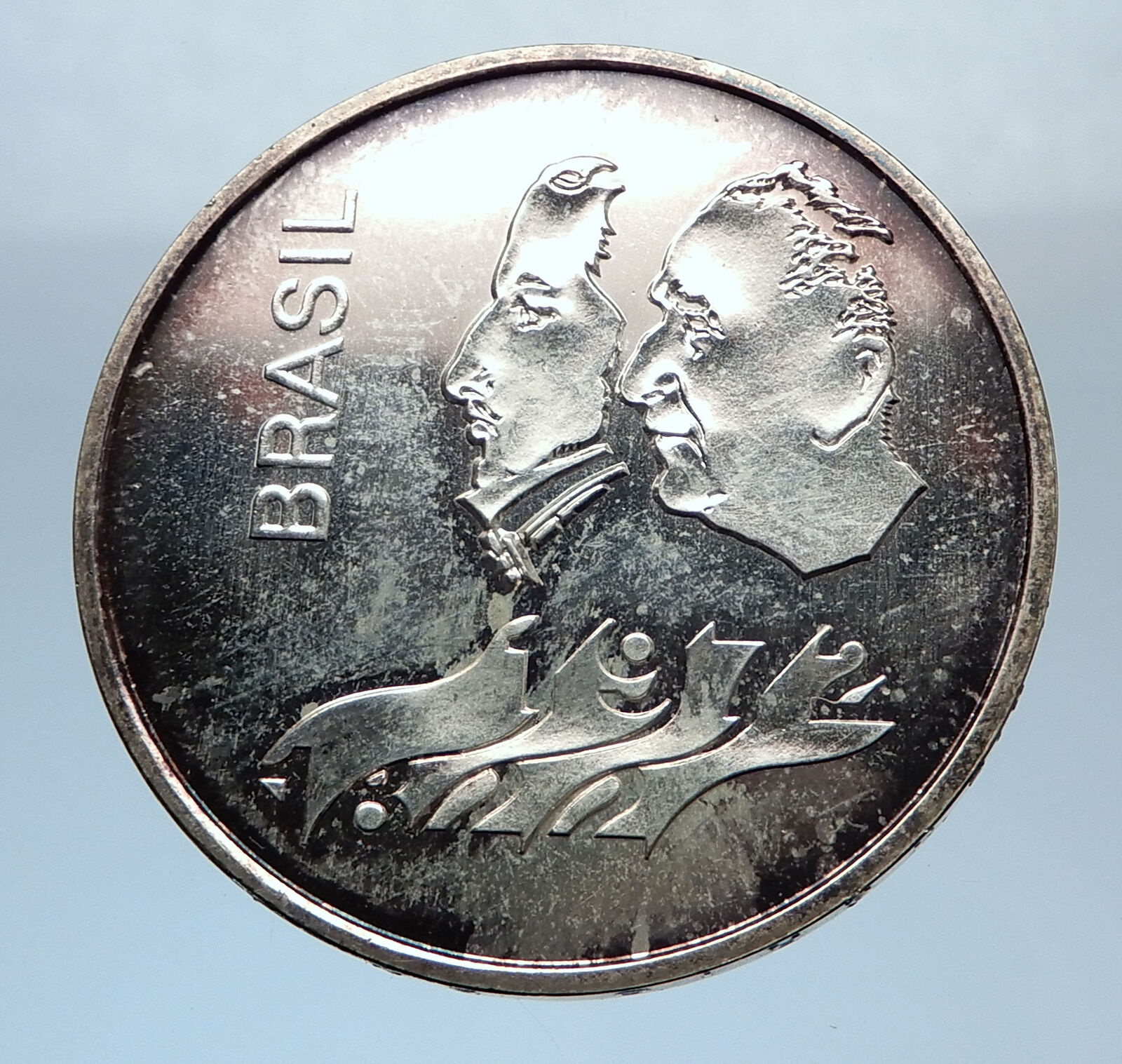|
Brazil
1907 Silver 2000 Reis 33mm (19.97 grams) 0.900 Silver (0.5787 oz. ASW)
Reference: KM# 508 (1906-12)
REPUBLICA DOS ESTADOS UNIDOS DO BRASIL * *, Laureate liberty head left, date below flanked by stars.
ORDEM E PROGRESSO 2000 RÉIS * XX GRAMMAS *, Two ornate lines separate text.
You are bidding on the exact item pictured, provided with a Certificate of Authenticity and Lifetime Guarantee of Authenticity.
 Broadly speaking, liberty (Latin: Libertas) is the ability to do as one pleases. In politics, liberty consists of the social, political, and economic freedoms to which all community members are entitled. In philosophy, liberty involves free will as contrasted with, determinism. In theology, liberty is freedom from the effects of “sin, spiritual servitude, [or] worldly ties.” Broadly speaking, liberty (Latin: Libertas) is the ability to do as one pleases. In politics, liberty consists of the social, political, and economic freedoms to which all community members are entitled. In philosophy, liberty involves free will as contrasted with, determinism. In theology, liberty is freedom from the effects of “sin, spiritual servitude, [or] worldly ties.”
Sometimes liberty is differentiated from freedom by using the word “freedom” primarily, if not exclusively, to mean the ability to do as one wills and what one has the power to do; and using the word “liberty” to mean the absence of arbitrary restraints, taking into account the rights of all involved. In this sense, the exercise of liberty is subject to capability and limited by the rights of others. Thus liberty entails the responsible use of freedom under the rule of law without depriving anyone else of their freedom. Freedom is more broad in that it represents a total lack of restraint or the unrestrained ability to fulfill one’s desires. For example, a person can have the freedom to murder, but not have the liberty to murder, as the latter example deprives others of their right not to be harmed. Liberty can be taken away as a form of punishment. In many countries, people can be deprived of their liberty if they are convicted of criminal acts.
.svg/250px-Brazil_(orthographic_projection).svg.png)  Brazil, officially the Federative Republic of Brazil, is the largest country in both South America and Latin America. As the world’s fifth-largest country by both area and population, it is the largest country to have Portuguese as an official language-and the only one in the Americas. Brazil, officially the Federative Republic of Brazil, is the largest country in both South America and Latin America. As the world’s fifth-largest country by both area and population, it is the largest country to have Portuguese as an official language-and the only one in the Americas.
 Bounded by the Atlantic Ocean on the east, Brazil has a coastline of 7,491 km (4,655 mi). It borders all other South American countries except Ecuador and Chile and covers 47.3% of the continent’s land area. Its Amazon River basin includes a vast tropical forest, home to diverse wildlife, a variety of ecological systems, and extensive natural resources spanning numerous protected habitats. This unique environmental heritage makes Brazil one of 17 megadiverse countries, and is the subject of significant global interest and debate regarding deforestation and environmental protection. Bounded by the Atlantic Ocean on the east, Brazil has a coastline of 7,491 km (4,655 mi). It borders all other South American countries except Ecuador and Chile and covers 47.3% of the continent’s land area. Its Amazon River basin includes a vast tropical forest, home to diverse wildlife, a variety of ecological systems, and extensive natural resources spanning numerous protected habitats. This unique environmental heritage makes Brazil one of 17 megadiverse countries, and is the subject of significant global interest and debate regarding deforestation and environmental protection.
Brazil was inhabited by numerous tribal nations prior to the landing in 1500 of explorer Pedro Álvares Cabral, who claimed the area for the Portuguese Empire. Brazil remained a Portuguese colony until 1808, when the capital of the empire was transferred from Lisbon to Rio de Janeiro. In 1815, the colony was elevated to the rank of kingdom upon the formation of the United Kingdom of Portugal, Brazil and the Algarves. Independence was achieved in 1822 with the creation of the Empire of Brazil, a unitary state governed under a constitutional monarchy and a parliamentary system. The ratification of the first constitution in 1824 led to the formation of a bicameral legislature, now called the National Congress. The country became a presidential republic in 1889 following a military coup d’état. An authoritarian military junta came to power in 1964 and ruled until 1985, after which civilian governance resumed. Brazil’s current constitution, formulated in 1988, defines it as a democratic federal republic. The federation is composed of the union of the Federal District, the 26 states, and the 5,570 municipalities.
Brazil’s economy is the world’s ninth-largest by nominal GDP and seventh-largest by GDP (PPP) as of 2015. A member of the BRICS group, Brazil until 2010 had one of the world’s fastest growing major economies, with its economic reforms giving the country new international recognition and influence. Brazil’s national development bank plays an important role for the country’s economic growth. Brazil is a founding member of the United Nations, the G20, BRICS, Unasul, Mercosul, Organization of American States, Organization of Ibero-American States, CPLP, and the Latin Union. Brazil is a regional power in Latin America and a middle power in international affairs, with some analysts identifying it as an emerging global power. One of the world’s major breadbaskets, Brazil has been the largest producer of coffee for the last 150 years.
|




 Broadly speaking, liberty (Latin: Libertas) is the ability to do as one pleases. In politics, liberty consists of the social, political, and economic freedoms to which all community members are entitled. In philosophy, liberty involves free will as contrasted with, determinism. In theology, liberty is freedom from the effects of “sin, spiritual servitude, [or] worldly ties.”
Broadly speaking, liberty (Latin: Libertas) is the ability to do as one pleases. In politics, liberty consists of the social, political, and economic freedoms to which all community members are entitled. In philosophy, liberty involves free will as contrasted with, determinism. In theology, liberty is freedom from the effects of “sin, spiritual servitude, [or] worldly ties.” .svg/250px-Brazil_(orthographic_projection).svg.png)
 Brazil, officially the Federative Republic of Brazil, is the largest country in both South America and Latin America. As the world’s fifth-largest country by both area and population, it is the largest country to have Portuguese as an official language-and the only one in the Americas.
Brazil, officially the Federative Republic of Brazil, is the largest country in both South America and Latin America. As the world’s fifth-largest country by both area and population, it is the largest country to have Portuguese as an official language-and the only one in the Americas. Bounded by the Atlantic Ocean on the east, Brazil has a coastline of 7,491 km (4,655 mi). It borders all other South American countries except Ecuador and Chile and covers 47.3% of the continent’s land area. Its Amazon River basin includes a vast tropical forest, home to diverse wildlife, a variety of ecological systems, and extensive natural resources spanning numerous protected habitats. This unique environmental heritage makes Brazil one of 17 megadiverse countries, and is the subject of significant global interest and debate regarding deforestation and environmental protection.
Bounded by the Atlantic Ocean on the east, Brazil has a coastline of 7,491 km (4,655 mi). It borders all other South American countries except Ecuador and Chile and covers 47.3% of the continent’s land area. Its Amazon River basin includes a vast tropical forest, home to diverse wildlife, a variety of ecological systems, and extensive natural resources spanning numerous protected habitats. This unique environmental heritage makes Brazil one of 17 megadiverse countries, and is the subject of significant global interest and debate regarding deforestation and environmental protection.




